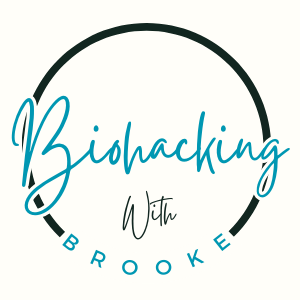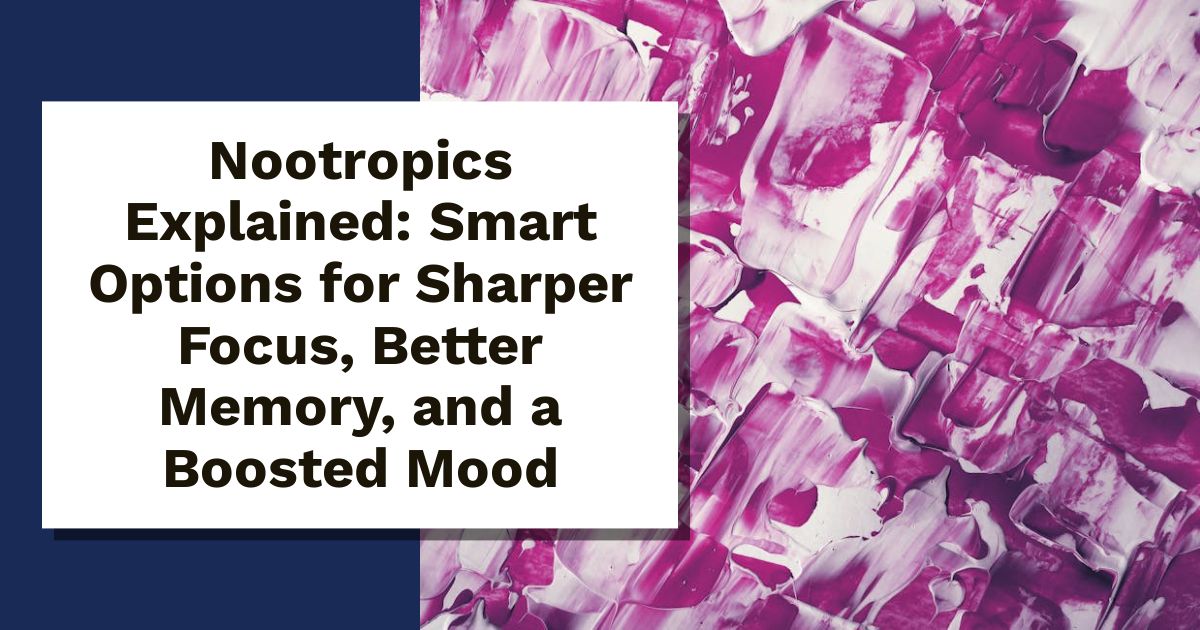Imagine popping a pill and feeling sharper, faster, and more in control of your mental game. That’s the promise of nootropics, often called “smart drugs.” Loved by biohackers, these supplements claim to boost focus, memory, and mood. But are they just trendy, or do they really work? Stick around to learn what’s behind the buzz.
What Are Nootropics?
If you’ve ever wished for a mental edge—whether to crush a work deadline, ace that exam, or simply feel sharper—you’re not alone. Nootropics, often known as “smart drugs,” promise to enhance focus, memory, and overall cognition. Let’s break down how these brain boosters work and what kinds you might encounter.
The Science Behind Nootropics
Nootropics influence your brain’s chemistry by targeting neurotransmitters, the brain’s chemical messengers. These substances interact with pathways responsible for focus, learning, and even stress management.
- Dopamine and serotonin: Some nootropics boost these feel-good chemicals, enhancing mood and motivation.
- Acetylcholine: Known as the “learning neurotransmitter,” it’s essential for memory and problem-solving. Certain nootropics increase its availability.
- Glutamate: Critical for neural communication and cognitive function, it’s a key player in learning.
- Blood flow: Many nootropics improve cerebral blood flow, giving your brain the oxygen and glucose it needs to perform better.
Curious to dig deeper into how nootropics interact with brain functions? Check out this scientific breakdown that links nootropics with neurotransmitter modulation.
Different Types of Nootropics
Nootropics come in two main flavors: natural and synthetic. Both types aim to boost your brainpower, but they have different origins.
- Natural Nootropics:
- Herbs and plants: Examples include Bacopa Monnieri and Ginkgo Biloba, known for their memory-enhancing effects.
- Amino acids: L-theanine, frequently combined with caffeine, promotes calm focus.
- Adaptogens: Rhodiola Rosea helps combat stress while boosting focus.
- Synthetic Nootropics:
- Racetams: Piracetam and its family are popular for improving memory and cognition.
- Modafinil: A prescription option often used to combat fatigue and improve wakefulness.
- Amphetamine-based drugs: Prescribed for ADHD, these enhance focus but come with potential side effects.
Each path has pros and cons. While natural nootropics are gentler on the body, synthetic options often pack a stronger punch. If you’re interested in a balanced take on these two types, explore this helpful guide.
Popular Nootropics on the Market
Let’s look at some nootropics you may already know or might want to try:
- Caffeine: The world’s most loved nootropic. It’s well-known for boosting alertness and concentration.
- L-theanine: Found in green tea, it complements caffeine by promoting calm without making you drowsy.
- Racetams: Substances like piracetam enhance memory and learning.
- Bacopa Monnieri: A natural herb known to improve memory retention over time.
- Modafinil: Favored by professionals for extended wakefulness and focus (ask your doctor before use).
For a more comprehensive list of top picks, check out this expert review of well-known nootropics and their effects.
Stay tuned for the next section, where we’ll explore how to use nootropics effectively while avoiding potential risks.
Benefits of Nootropics
Nootropics offer several advantages that can transform how we approach tasks, learning, and daily challenges. Whether you’re a student looking to study harder or a professional aiming to boost productivity, these smart drugs have much to offer. Let’s explore some of the key benefits.
Enhanced Focus and Concentration
Nootropics are known for sharpening focus and concentration. Imagine trying to read a book while a TV blares in the background. With the right nootropic, you could filter out distractions effortlessly. Several studies suggest that certain nootropics can improve your attention span and help you stay on track.
- Caffeine: This popular stimulant enhances alertness and can propel you through a tough project.
- Modafinil: Originally developed for sleep disorders, it’s become a favorite among those needing sustained focus, especially for long work hours.
For more on how nootropics can boost concentration, check out this informative overview.
Better Memory and Learning
If you’re looking to remember more and learn faster, nootropics could be your ally. They often support memory retention and can increase the speed at which you absorb new information. Picture cramming for a test but actually retaining all that information!
- Bacopa Monnieri: This natural herb has shown promise in improving memory over time.
- Racetams: These synthetic nootropics may boost cognitive function, enhancing both memory and learning power.
A detailed analysis on how nootropics impact memory can be found in this scientific study.
Mood and Motivation Boost
Feeling sluggish or unmotivated? Some nootropics can lift your spirits and invigorate your drive. Picture your brain getting a motivational pep talk, helping you take on the challenges of the day.
- Dopamine enhancers: Certain nootropics boost dopamine levels, the brain’s feel-good chemical, promoting a positive mood.
- L-theanine combined with caffeine: This dynamic duo can provide calm focus without the jitters.
To dive deeper into how nootropics can revitalize your mood, explore this article about motivation and nootropics here.
These benefits showcase how nootropics can serve as allies in pursuit of productivity, learning, and an uplifting mindset.
Risks and Side Effects
While nootropics can offer numerous benefits, it’s essential to understand that they also come with potential risks and side effects. Not all nootropics affect everyone the same way, and caution is advised.
Common Side Effects
Some popular nootropics may have side effects that can impact your experience. Here are some common side effects associated with frequently used nootropics:
- Insomnia: Many nootropics can disrupt sleep patterns, especially stimulants like caffeine and modafinil.
- Anxiety: While some nootropics can enhance mood, others may heighten feelings of anxiety or restlessness.
- Headaches: Users of racetams and other synthetic options often report headaches as a side effect.
- Nausea: Some people experience stomach discomfort, particularly with nootropic supplements taken on an empty stomach.
- Increased Blood Pressure: Stimulants like caffeine can temporarily raise blood pressure, posing risks for individuals with underlying health issues.
This overview of nootropics provides a deeper dive into potential side effects that users should be aware of.
Who Should Avoid Nootropics?
Not everyone should jump on the nootropic bandwagon. Certain groups are advised to exercise caution or avoid these substances altogether:
- Pregnant or Nursing Women: The effects of many nootropics on pregnancy and breastfeeding aren’t well-studied, making it risky.
- Individuals with Heart Conditions: Those with a history of heart issues should steer clear, as stimulants can strain the cardiovascular system.
- People with Anxiety Disorders: Nootropics that stimulate the nervous system may exacerbate anxiety symptoms.
- Individuals Taking Other Medications: Some nootropics can interact negatively with prescription or over-the-counter drugs. Always consult a healthcare professional before mixing.
- Young Individuals: The long-term effects of nootropic use in children and teenagers are unknown, so it’s safer to be cautious.
If you want to read further on safety and interactions, check out this article on nootropics benefits and safety.
How to Choose the Right Nootropic
Selecting the right nootropic isn’t just about what’s trendy. It requires careful thought and evaluation. Here’s how to approach this decision wisely.
Consulting a Professional
Before diving into the nootropic pool, it’s best to consult a healthcare provider. Think of them as your guide through the brain-boosting jungle. They can help you navigate the maze of options and recommend what suits your needs.
Whether you’re aiming to enhance focus or improve memory, a professional can assess your health background and any medications you’re taking. They’ll consider your individual goals and determine if a specific nootropic is suitable for you.
You don’t want to jump in without knowing the risks. For more information on consultations, check out this helpful resource.
Experiment Safely
Once you’ve consulted with a professional, it’s time to experiment—but safely! Start with lower doses. This is like taking baby steps before running a marathon. You’ll want to observe how your body reacts without overwhelming it.
Keep a journal. Note how you feel, any side effects, and any improvements in focus or productivity. This will help you find the optimal dose for your needs.
Remember, not all nootropics are created equal. Some work better for certain individuals than others. Don’t hesitate to shift your approach based on your experiences. For a deeper look into dosage and efficacy, you can read this detailed study.
By taking these careful steps, you can find the right nootropic that helps you reach your cognitive goals without unnecessary risks.
Future of Nootropics
As the world around us evolves, the future of nootropics is looking brighter than ever. With ongoing research and technological innovations, nootropics are set to become increasingly sophisticated and accessible. This section will explore the research trends and the potential influence of technology on the usage of these brain-boosting substances.
Trends in Research and Development
The research surrounding nootropics is rapidly expanding. Scientists and companies are dedicated to discovering new compounds and improving existing formulations. They aim to enhance cognitive functions like memory, focus, and mood stabilization. Here are a few observed trends:
- Natural vs. Synthetic: There’s a growing interest in natural nootropics, such as those derived from herbs and plants. Studies show that these may offer cognitive benefits with fewer side effects. Research has established a strong link between natural substances and cognitive enhancement. Check out this article on natural nootropics.
- Personalization: Custom nootropic stacks tailored to individual needs are gaining traction. Consumers want specific combinations that target their unique cognitive challenges.
- Longitudinal Studies: Researchers are now focusing on the long-term effects of nootropic use. This knowledge could lead to safer and more effective recommendations.
The nootropic market is projected to grow significantly. Some estimates suggest it could reach over $5 billion by 2024, driven by consumer demand and increased awareness about cognitive enhancers. Explore this market report for more insights on growth trends.
Nootropics and Technology
Technology is playing a critical role in shaping the future of nootropic use. The intersection of cognitive enhancers and tech advancements presents interesting possibilities:
- Wearable Devices: Gadgets like smartwatches and headsets can track cognitive performance and suggest nootropic dosages. Imagine getting real-time feedback on how well your brain is functioning!
- Data Analytics: Companies can utilize AI to analyze user data and develop nootropic formulations tailored to specific needs. This could lead to the formulation of nootropics based on genetic and biometric information.
- E-commerce Growth: As e-commerce platforms expand, nootropic availability will increase. Consumers will have easier access to a variety of products, boosting market competition and innovation.
The blend of nootropics and technology aims to make cognitive enhancement more effective and personalized. Stay updated on these fascinating developments by checking out this recent article from The Guardian.
The horizon for nootropics is expansive. With continuous research and technological innovations, these smart drugs are on track to become even more impactful in our quest for cognitive improvement.
Conclusion
Nootropics offer exciting possibilities for anyone looking to enhance their cognitive abilities and mood. From boosting focus to improving memory, these smart drugs hold promise for students and professionals alike. However, tread carefully. Understanding potential side effects and consulting with a healthcare provider is essential before diving in.
Brooke is a rock-climbing 🧗♀️, tennis-playing 🎾, biohacking 🧬 bookworm 📚 on a mission to unlock the secrets of health, longevity, and living life to the fullest 🌟. When she’s not scaling cliffs, hitting the courts, or testing out the latest hacks, you’ll find her nose in a book or adventuring with her four-legged best friend 🐕 by her side. With a knack for turning science into simple, actionable tips, Brooke’s writing is your guide to hacking your biology and living your best, most vibrant life!


